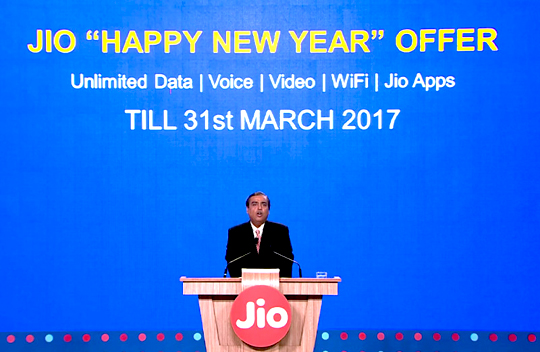Mumbai, Dec 1: Amassing 52 million subscribers in less than three months, Reliance Jio chief Mukesh Ambani today announced extension of free voice and data offer for existing and new consumers till March 31.

Reliance Jio, he said, is the fastest-growing technology company in the world.
"In the first 3 months, Jio has grown faster than Facebook, WhatsApp or Skype," Ambani said.
"Starting December 4, 2016, every new Jio user will get Jio's data, voice, video and the full bouquet of Jio applications absolutely free till March 31, 2017," he said, adding that the 'Jio Happy New Year Offer' will also be extended to existing customers on current SIMs.
Ambani, Reliance Industries Chairman, in September, had stormed into the telecom business announcing free voice and data till December-end.
On an average, a Jio customer is using 25 times more data than the average Indian broadband user, he said, adding that Jio has signed up over 6 lakh customers every single day for the past 3 months.
Ambani has accused incumbent operators like Bharti Airtel of anti-competitive behaviour by delaying providing points of interconnection that had led to blocking of nearly 900 crore voice calls from Jio to other networks.
"Benefits of Jio's superior technology have been denied to customers due to anti-competitive behaviour of incumbent operators," he said further, adding that the call block rate has come down to nearly 20 per cent as of yesterday from over 90 per cent.





Comments
Add new comment